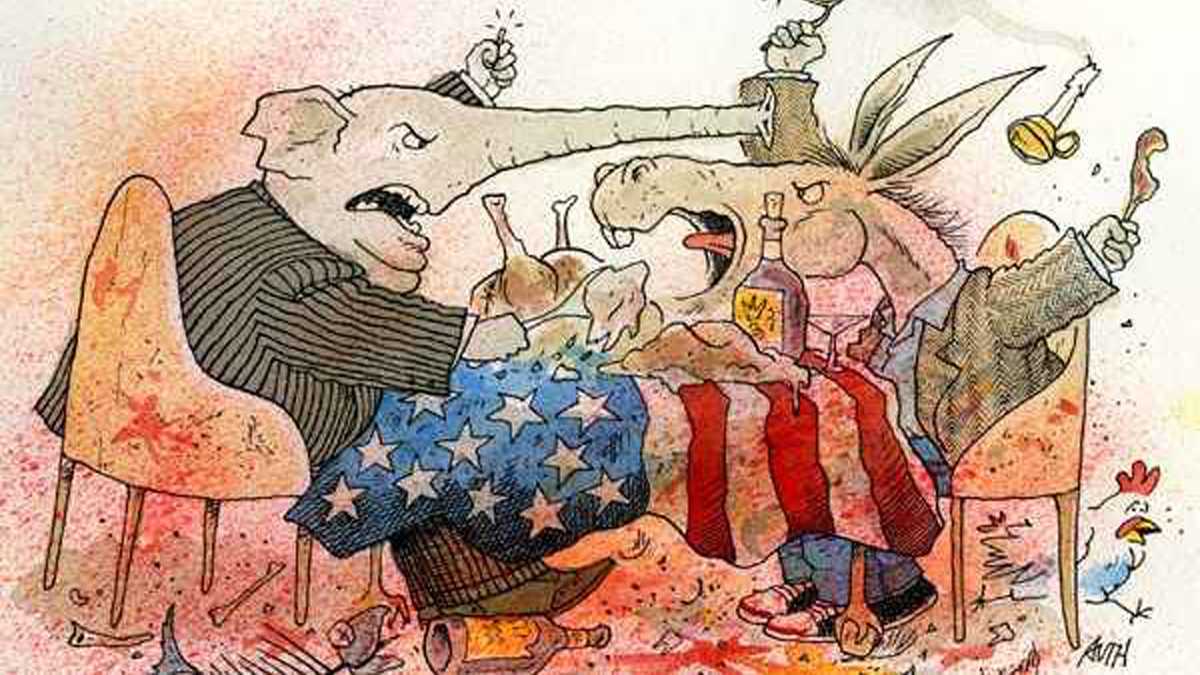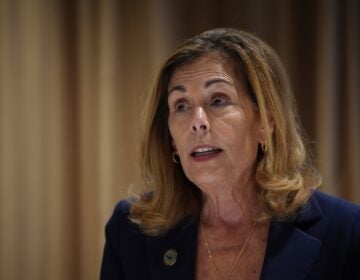Drawn to or dreading politics at Thanksgiving, election making for awkward holiday dinner
Listen
(Tony Auth
Thanksgiving is supposed to be a time for bonding with your family.
On the heels of this year’s tempestuous presidential campaign, some people plan to use the holiday table as a platform to share their opinions, possibly channeling Frank Costanza during the “Festivus” episode of “Seinfeld.”
“The tradition of Festivus begins with the airing of grievances. I got a lot of problems with you people! Now, you’re going to hear about it!” his character, played by Jerry Stiller said, explaining an essential part of the holiday he created.
Gail Madison of the Madison School of Etiquette and Protocol in Huntingdon Valley said no matter how strongly they may feel, people should avoid discussing controversial topics like politics over turkey and stuffing.
“People get very emotional and heated and they’re very, you know they have their opinions, and it’s hard for them to control themselves with highly emotional topics,” she said. “It usually ends in some sort of an argument or an embarrassment.”
Madison said people should feel better after having spent time with each other for Thanksgiving, not aggravated. The trouble is, for many people not being able to discuss politics with family only breeds resentment.
Jerilyn Dressler lives in the Fairmount section of Philadelphia. She voted for Hillary Clinton. Her parents voted for Donald Trump. She said their decision has been very difficult for her process. When Dressler tried to talk to her mother about it, she said the conversation escalated. Her mother asked how dare she question her decision and demanded she never bring up the subject again.
“It hurt me because she didn’t even want to entertain the discussion really of like why I was so hurt by it,” said Dressler.
Mary Black is a 28-year-old high school administrator in the Philadelphia suburbs. Black said during the campaign her father sent her politically themed emails, she felt many were misinformed. When she tried to approach the topic with her father he shut her down. Now, they are barely speaking to each other.
“It’s a very strange feeling,” Black said, “to have this man tell you that you matter and that you’re worthwhile and that you can use your voice to be heard and then actively shushes you. “
Samantha Rusu is a scientist for a cell therapy lab at the University of Pennsylvania. Even though she considers herself to have a close relationship with her sister, she was surprised to learn she felt the opposite way about a lot of the issues brought up during the presidential campaign. Rusu said she has tried to discuss their differences, but her sister refused because he felt like she was being attacked.
“I would love to be able to talk to her about it,” Rusu said. “It’s something that I think, you know a relationship can get stronger if you’re comfortable talking about these sorts of issues if you understand each other better. And I want to learn why she supports him.”
Rusu admits she and her sister may be living in different social media bubbles. However, she’s hopeful a frank conversation could be eye opening for both of them. “Maybe there is stuff that you know I’m overlooking and maybe there’s stuff she’s overlooking. And I think we can become a stronger, have a stronger bond if we were able to talk about more, more in depth issues.”
So, why do some people want to talk about politics and why do some people want to avoid the conversation altogether?
Jade Logan, a licensed psychologist and professor at Chestnut Hill College, says there is a real tension here — people want to talk about things they are passionate about and at the same time want to avoid conflict.
“People don’t like to be uncomfortable,” said Logan. “People want homeostasis, right? They want it to be good on the inside and the outside, and I think this election created, it’s not good on the inside or the outside, and some people are ready to fight and some people are just like let me pull back.”
Logan said for some people not being able to talk about it can be unhealthy. If a topic is off limits, she wonders how strong the relationship is.
If you must talk about Hillary and Donald, Logan advises to be prepared to listen and to know what you want out of your relationship with others at the table.
“You have to be open and you have to be willing to be uncomfortable and willing to agree to disagree.”
You could always bring up religion instead, that’s never caused arguments at the holidays …
WHYY is your source for fact-based, in-depth journalism and information. As a nonprofit organization, we rely on financial support from readers like you. Please give today.




